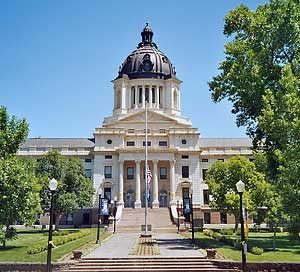 South Dakota has been recognized a national leader in regulated trust companies. With more regulated trust companies than any other state in the country, South Dakota has become the jurisdiction of choice for those looking to establish a regulated private or a public trust company. South Dakota has possibly the best combination of trust law, trust company law, regulatory environment, and state economic stability in the United States. Contact AFS to learn how South Dakota offers trust companies strong liability protection and organizational flexibility.
South Dakota has been recognized a national leader in regulated trust companies. With more regulated trust companies than any other state in the country, South Dakota has become the jurisdiction of choice for those looking to establish a regulated private or a public trust company. South Dakota has possibly the best combination of trust law, trust company law, regulatory environment, and state economic stability in the United States. Contact AFS to learn how South Dakota offers trust companies strong liability protection and organizational flexibility.
Frequently Asked Questions
How long does it take to secure a trust company charter?
Assuming the application meets the South Dakota Division of Banking’s standards, a trust company charter is typically received in 6 to 9 months from the date the application is submitted to the Division of Banking. For a complete outline of the application process, please contact AFS.
Where can I access the application to secure my trust company charter?
The application can be found on the South Dakota Division of Banking’s website. AFS can guide you through the application process. https://dlr.sd.gov/banking/trusts/forms/trust_company_charter_application.pdf
What is the difference between a private trust company and a public trust company?
As defined in South Dakota codified law and its corresponding administrative rules, a private trust company is one that does not engage in trust company business with the general public or otherwise hold itself out as a trustee or fiduciary for hire by advertising, solicitation, or other means and instead operates for the benefit of a family or families, regardless of whether compensation is received or anticipated. A public trust company is a trust company that engages in trust company business with the general public by advertising, solicitation, or other means, or a trust company that engages in trust company business but does not fall within the definition of a private trust company.
How many board members do I need?
South Dakota public trust companies must have at least five and no more than twelve board members. South Dakota private trust companies must have at least three board members and no more than twelve board members. Pursuant to South Dakota law, at least one board member must be a South Dakota resident. AFS can provide your South Dakota resident director.

What are the capital requirements for a trust company in South Dakota?
In South Dakota, pursuant to SDCL § 51A-6A-19, the statutory minimum capital requirement for all trust companies is $200,000. However, the director may require the trust company have capital in excess of $200,000 if the director determines that the amount and character of the anticipated business of the trust company and the safety of the customers so require.
For South Dakota private trust companies, it is recommended the trust company is initially capitalized with at least $250,000 at inception.
For South Dakota’s public trust companies, the director will require a minimum capital position of at least $400,000. It is recommended a public trust company is initially capitalized with at least $450,000 to $500,000 at inception to allow for operating expenses. However, capitalization will vary based on the proposed trust company’s overall risk profile and pro-forma income and expense projections.
South Dakota trust companies must maintain a pledge account to the South Dakota Division of Banking which must be held in a depository institution in South Dakota. Most frequently, private trust companies must maintain a pledge in the amount of $100,000, while public trust companies must maintain a pledge in the amount of $200,000. The pledge to the South Dakota Division of Banking can be counted as trust company capital.
How much does it cost to operate a trust company?
The annual costs of operation can vary greatly between trust companies. At a minimum, annual costs are typically at least $100,000 for a regulated trust company. However, the actual cost will vary based on your business plan.
What fees are due to the state?
Trust company application- $5,000 application fee and $600 publication fee (one-time fees)
Supervision Fee- A South Dakota-chartered trust company is subject to an annual supervisory fee computed at the rate of seven cents per $10,000 of total trust assets under management, administration, or custody as reported as of the end of December. The minimum annual fee is $3,750 and the maximum annual fee is $20,000 for private trust companies, while the minimum annual fee is $4,500 and the maximum annual fee is $30,000 for public trust companies.
Financial Institution Tax- A financial institution tax based on trust company net income is applied to South Dakota chartered trust companies. The annual minimum tax is $500 for fewer than 12 months of operation, $2,000 for over 12 months but less than 24 months of operation, $5,000 for over 24 months but less than 36 months of operation, $10,000 for over 36 months but fewer than 48 months of operation, and $25,000 annually after 48 months.
Examination fees- Private Trust Companies $8,000 to $12,000 per examination (approximately);
Public Trust Companies $12,000 to $18,000 per examination (approximately)
Does the trust company need to maintain insurance coverage and a financial institution bond?
Yes. Both public and private trust companies must have $1,000,000 of Directors and Officers insurance and maintain a financial institution bond in the amount $1,000,000. Although the costs of coverage can vary, expenses typically range between $12,500 to $15,000 for private trust companies and $15,000 to $18,000 for public trust companies. E & O coverage can be acquired, but is not required under state law. AFS can work with you to help secure a competitive rate.
Do private trust companies need to come to South Dakota for meetings?
South Dakota private trust companies are encouraged to hold at least one board meeting per year in South Dakota. There may be other considerations for private trust companies to hold board meetings in South Dakota on a more frequent basis (i.e. trust and tax situs considerations).
Do public trust companies need to come to South Dakota for meetings? Other requirements?
South Dakota public trust companies are required to meet minimum requirements as outlined by state law. AFS can help your trust company with the requirements as outlined below.
51A-6A-11.1. Public trust companies to maintain office and perform trust administration in South Dakota.
A public trust company shall:
(1) Maintain office space in South Dakota for trust company business and for the storage of, and access to, trust company records required by § 51A-6A-30;
(2) Hold no less than two quarterly governing board meetings with a majority physically present in South Dakota each calendar year;
(3) Employ, engage, or contract with at least one trust officer or key employee to provide services for the trust company in South Dakota related to the powers of the company in § 51A-6A-29 and to facilitate the examinations required by § 51A-6A-31; and
(4) Perform trust administration in South Dakota.
The commission may promulgate rules, pursuant to chapter 1-26, to establish additional guidelines regarding what constitutes trust administration in South Dakota for purposes of this section.

20:07:22:04. Trust administration defined. For purposes of SDCL 51A-6A-11.1, trust administration in South Dakota means that at least three of the following are performed wholly or partly in South Dakota for the accounts under the management, administration, or custody of the trust company:
(1) Annual account reviews;
(2) Annual investment reviews;
(3) Trust accountings;
(4) Account correspondence;
(5) Completing trust account tax returns; or
(6) Distributing account statements.
Notwithstanding the definition above, trust administration as set forth in SDCL 51A-6A-11.1(4) may be satisfied by other means if the director determines the nature and degree of risks presented by the trust company are low based upon a review of the size, nature, and number of accounts administered by the trust company and the number of employees or persons performing services for the trust company in South Dakota.
If the size, risk profile, or rate of growth of a trust company changes, the director may, to the extent it is deemed necessary, require additional administration be performed in South Dakota to satisfy the requirement in SDCL 51A-6A-11.1(4) as defined by this section.
How often are trust companies examined by the South Dakota Division of Banking?
South Dakota trust companies are required to be examined at least once every thirty-six months pursuant to SDCL § 51A-6A-31. Typically, South Dakota public trust companies are examined approximately every twenty-four months and private trust companies are examined at least once every thirty-six months.
What should I anticipate in an examination?
The South Dakota Division of Banking follows the interagency trust rating system. The examiners will assess the trust company’s Management, Operations, Earnings, Compliance, and Asset Management (MOECA). AFS can help your trust company prepare for examinations.
How many chartered trust companies are in South Dakota?
There are more regulated trust companies in South Dakota than any other state in the United States. As of May 2024, there are 69 public trust companies and 49 private trust companies in South Dakota.
Is South Dakota Division of Banking an accredited member of the Conference of State Bank Supervisors? Yes, South Dakota is an accredited member. Accreditation provides an independent validation that the accredited agency’s personnel, policies, and processes meet the high standards required of accredited agencies. Accreditation involves a comprehensive review of the agency’s operations, including administration and finance, personnel, training, examination, supervision and legislative powers. State agencies that meet these standards are setting themselves apart and improving their reputation in the regulatory arena.

